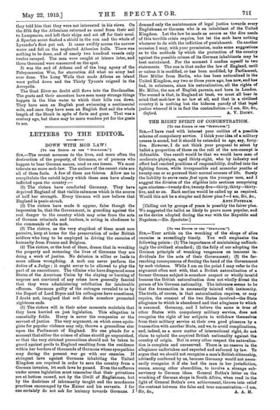THE CRAFTY, BRINY RIVER.
S0 crafty was it—the " river " of the Dardanelles—that the ungainly little ships of thirty centuries ago preferred to unload before they reached it. Their cargoes went by land to the upper sea, where other vessels waited, and on the way the citizens of Troy took tribute from the laden mules. For it was profitable to be a citizen of Troy in those days, and that Trojan toll has made some history. When Troy was powerful it was rich, and every Priam kept his city like a strong man armed, but the coveted site changed masters as noon as a stronger came. There were countless sieges and sacks of Troy, though legend sees them all as one, and sometimes the city perished altogether and a new one ref* upon its ashes. Nine such rebirths have left their traces. The struggles around the " windy " hill were savage, no doubt, and perhaps sordid too—it was brigands fighting brigands—but if we could only see the Sixth City again with its great towered walls, and inside it the gold and the rich blue of the edaroe, we could believe well enough in the splendour that Homer sheds about his princely pirates. They generally fought in sunshine and always in radiant armour—metals are flashing all through the tale ; they were probably big fair Northerners themselves, and the poems call them " flowing haired." Perhaps Homer's " godlike " was not a bad word for the best of them. Things are different now in the Fiala of Troy. "It is un- soldierly to have long hair," our inspecting officers always say, and a French "kepi" is a poor substitute for a "glancing helm." The " pantalon rouge" is bright, of course, but it is nothing to the Achaeans' "shining greaves." But these are the least of the changes, and it is a solemn thought that a corporal and a file of men, "as men now are," could take Priam's Troy in half an hoar. The French only made a feint into the Trojan Plain, but they took and hold Sigeum, and the rifles must have been heard crackling all along &amender and the Xanthus that Achilles choked with dead.
The French are fighting there because the Hellespont is still a "crafty river," though its craft has long since ceased to make Troy rich ; and yet, whatever its conduct now, the Hellespont once struck a good blow in a good cause. Xerxes in command of the whole East was on the march for Europe, and the little flame which burned at Athens and has since lit all the world seemed likely to be stamped out by his millions. Now Xerxes had a summary way of dealing with geography ; he cut clean through Mount Athos, where his father's fleet wus wrecked, and when his army reached the Scamaader it simply drank it dry. A mere mile of water, then, the Xing and his host would take in their stride of course. So they built a bridge across the Hellespont--a double bridge of boats nearly a mile in length—and the Hellespont waited till it was quite complete :— "And then when the Strait was now bridged, there came a great storm and broke down all that work and ended it. And when Xerxes learnt it he held it to be a monstrous thing, and be ordered three hundred strokes of the lash to be laid upon the Hellespont, and a pair of fetters to be let down into the water. . . . Now he bade them as they scourged the Strait to say words barbarous and presumptuous. ' 0 thou bitter water, thy lord lays this punishment upon thee for that thou didst do him hurt albeit he bad done no hurt to thee. And King Xerxes shall go over thee whether thou wilt or not. No man doeth 'honour to thee with sacrifice, and it is seen now that this is right, for thou art a crafty, briny river.'"
After this plain speaking the Hellespont gave up the struggle, and in reward for its complaisance it received "a. golden cup and a golden mixing-bowl and a Persian sword which they call a scimitar." But it had had its fun.
This all happened a mile or two above the Narrows that defied the Allies' first assault. A good deal further up on the Gallipoli side, in the " Chersonese," as it then was, Alci- biades had a castle of his own, and there he lived after his last exile, seventy-five years after Xerxes, and watched the ships that passed down the Strait bearing Russian corn to the city where he could not go. They were tired of meteoric people in Athens just then; the city was hard pressed and her last fleet wan afloat. Alcibiades might have saved every- thing or ruined everything—he had done both before—but Athens had burnt her wings in his genius too often to take the risk again. So he sat and watched the shipping in the Hellespont from the Gallipoli hills that are so like the Inver. mess-shire hills, and an cruelly easy to defend. One day in the late summer he rode down to the shore—he once had the finest horses in Greeoe, but perhaps it was a fat hill pony now—to the mouth of the little Goat River, Aegoepotami, where the Athenian fleet seemed about to commit suicide. The Spartan ships were across the Strait in Lampsamte, and eaoh day the Athenians challenged them to fight, and each day returned unsatisfied to the barren shore where the Goat River runs in. There was no food nearer than Sestoe, some miles away, and each day the men went off there and left the ships unmanned. Alcibiades protested to the Admirals against this long walk to lunch, and besought them to move the whole fleet to Seetos and never leave the ships. To us it all sounds like the vicious play of children, as so much of Greek fighting does, but thousands of brave lives and the life of Athens itself hung on this absurdity. But the Admirals did not see the danger, and it was a great chance to be rade to Alcibiades ;
they told him that they were not interested in his views. On the fifth day the Athenians returned as usual from their sail to Lampsacus, and left their ships and set off for their meal. A Spartan scout flashed a shield in the sun and the whole of Lysander's fleet put out. It came swiftly across the narrow water and fell on the neglected Athenian hulls. There was nothing to be done, and of nearly two hundred vessels only twelve escaped. The men were caught at leisure later, and three thousand were massacred on the spot.
It was the end of Athens and of the long agony of the Peloponnesian War, for starvation did what no army had ever done. The Long Walls that made Athens an island were pulled down and the Thirty Tyrants reigned in the Acropolis. The Goat River no doubt still flows into the Dardanelles. The goats and their ancestors have seen many strange things happen in the blue water to which their hills ran down. They have seen an English poet swimming a sentimental mile, and once they have seen an English fleet sail the whole length of the Strait in spite of forts and guns. That was a century ago, but there may be more wonders yet for the goats to see.



































 Previous page
Previous page